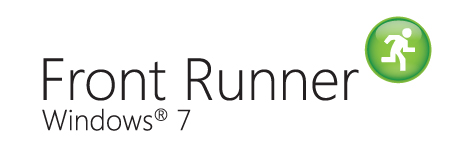
So, unless you’ve been sleeping under a rock you’ll probably be aware that today is the day that Windows Vista gets it’s official upgrade in the form of Windows 7. We got our hands on a beta copy as soon as it became available to MSDN subscribers and back in January I was able to report that Macro Scheduler 11 is compatible with the new operating system. In fact Macro Scheduler 11 is now listed as a “Windows 7 Front Runner” application. These are applications that already support Windows 7 on launch date.
I’ve actually been running Windows 7 on my main desktop since the RTM (Release to Manufacturing) version was made available in August. It was an easy upgrade from Vista. I like it. It feels more responsive than Vista (though I have no idea if it really is) and I’ve encountered no problems. The UAC prompts that gave Vista such a bad reputation can now be manually adjusted so rather than the two options – “Off and completely insecure” or “On but potentially very annoying” – you now have a sliding scale of annoyance. Personally I never had any problems with UAC and I’ve left Windows 7 running with the default options on my main desktop.
Compared to the horribly insecure default mode of XP that allows home users to unknowingly delete system files and install trojans; UAC in Vista and Windows 7 is a godsend. The trouble with XP was that if you did try and do the sensible thing and run in a restricted user account you’d find that so many things didn’t work. It was a pain to then switch to an Administrator account in order to install some software or make a system configuration change. The problem was self perpetuating in the sense that since most users ran in the default admin mode, developers of software assumed this was the case leading to software that only worked when run under an administrator user. This in turn lead to more people running as admin and not bothering to lock down their systems.
I think pretty much every home user I know who runs XP has at some point ended up with a virus or trojan on their computer. I’ve had to come to the rescue many a time. For friends and family with children in the household I’ve always encouraged the parents to only allow their children to use a restricted account, but found that they gave up because sites and software that the children wanted to use legitimately wouldn’t work easily without first changing their account to an administrator. Not surprisingly the parent got fed up with the hassle and gave up, or forgot to set the account back to restricted, and eventually I’d be called upon to fix yet another case of weird behaviour (of the computer, not the child or parent) which turned out to be due to a virus, trojan or some other system problem brought about because as an administrator anything can happen without the user’s knowledge.
That’s why I now encourage these families to upgrade to Windows 7. When administrator privileges are required – say to install a piece of software or browser plugin – the administrator password can be entered and the job is done. They should still make sure their kids are running in ordinary accounts though, because kids will probably still click YES on every UAC box they see! As an ordinary user, if the child does something that requires administrator privileges they will need to ask their parent or whoever is the administrator to approve it and enter the administrator password if they do. Otherwise no harm can be done.
In my view UAC therefore means LESS hassle and MORE security for families and end-users than XP offered. Sure, UAC might be annoying for advanced users who make configuration changes frequently, but they could switch it off in Vista or “turn it down” in Windows 7. But for general day-to-day use I would advise against it. I’d rather know that something wants Administrator access when it tries to do something, and I can purposefully choose to start something with Admin rights when I know that I’ll need it.
When I’m not in my office I use an Asus Eee PC 1000H Netbook. It’s a nifty little lightweight machine that has only 1gb RAM and came with XP installed. The Netbook trend has been for smaller, lighter machines with a long battery life and that generally means keeping the specification simple with a basic processor and small RAM. Traditionally PCs have been going in the opposite direction with Microsoft’s operating systems getting bulkier and more demanding. So the choice for Netbooks has so far been Linux, or XP if you wanted a Microsoft OS. But we can’t keep using XP forever and Microsoft needed to make sure their new operating system ran well on Netbooks and indeed claimed that Windows 7 would support them. I was interested to find out for myself how well Windows 7 would run on my Eee PC and was keen to ditch XP anyway. I now have Windows 7 running on my Netbook and I am very pleased. It boots up quickly, appears no less responsive than before and there is no appreciable difference in battery time.
So for me Vista was an improvement and Windows 7 is the polished version. Unfortunately it’s not possible to upgrade XP to Windows 7 without doing a clean installation. I wonder if that might slow down the adoption rate, although I see that Windows 7 is the biggest pre-order item at Amazon UK, beating Harry Potter! I’m not sure what that says, but after eight long years it’s definitely time to say bye bye to Windows XP.